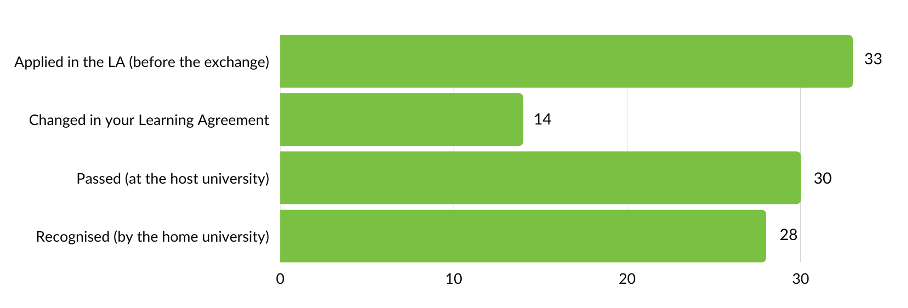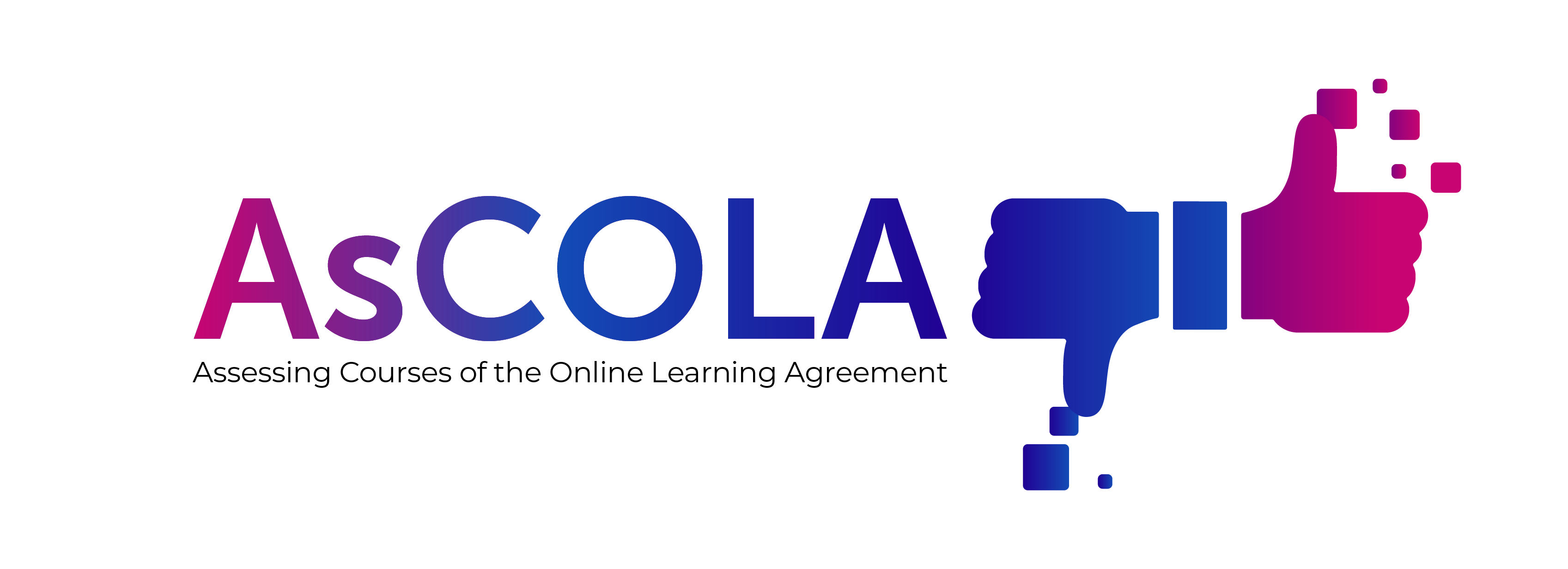Undertaking an Erasmus+ student mobility is a transformative experience, shaping students both academically and personally. Exposing them to new ways of learning methodologies, new campus environments, and academic cultures brings a set of opportunities and challenges. Moreover, statistics reveal that over 70% of students are motivated to participate in a mobility programme due to an interest to experience a different learning environment (ESNsurvey XV). Equally crucial is the influence of the academic reputation of the host institution, serving as a determining factor for students when selecting their mobility destination.
In light of these considerations, students form their expectations regarding the mobility experience early in the mobility cycle. Accessing information about the quality of education at the host institution, including insight collected through course evaluation from other students, emerges as a crucial factor in making informed decisions regarding mobility destinations.
However, while Quality Assurance mechanisms in Higher Education thrive on regular student feedback to enhance the learning experience, these mechanisms often overlook the specific needs of mobile students. This raises several questions: How can we bridge this gap? What steps can we take to ensure that the voices of mobile students are heard, and their experiences are duly considered in course improvements?
By examining the challenges faced by both mobile students and Higher Education Institutions when it comes to assessing courses, all the while considering the benefits that might come from improving it, the following insights aim to support stakeholders in understanding how to improve the quality and offer of student mobility.
Understanding the Challenges: Perspectives from Stakeholders
Erasmus Student Network Perspective:
Mentioning the ESNsurvey XV Preliminary report, Neli Kalinova, Education and Youth Policy Coordinator for ESN International, highlights the crucial role of comprehensive course information in the pre-departure phase.
For example, the ESNsurvey XV shows that access to information about available courses and general support in the preparation of the learning agreement is not as successful as it is desirable to be.
“They (universities) should be more transparent in terms of the courses they offer, they don’t clarify the language of those courses and if international students can take certain courses or not.” Student quote, ESNsurvey XV
Consequently, students often struggle to navigate opaque course catalogues and lack adequate support in drafting learning agreements. Therefore, it is not surprising that 42% of the respondents shared that their courses needed to be changed during the exchange, highlighting the importance of course information availability and accessibility.

ESNsurvey XV Preliminary report, 2023: Recognition of learning: How many credits you take & how much did your university recognise?
This lack of clarity not only exacerbates the already daunting task of selecting courses but also amplifies the pressure to ensure credit recognition upon return. Selecting matching courses is rated as the third most important factor by respondents in the ESNsurvey XV when choosing the exchange destination, with 29% of students reporting it important and 37% reporting it as a very important factor. The burden of navigating this complex landscape contributes significantly to the stress and dissatisfaction experienced by mobile students, impinging upon the holistic mobility experience.
“The course enrollment process was not very clear and very different from my sending university. Trying to enrol in a language course was a nightmare. There isn’t a huge selection and all of the classes are filled due to demand.” Student quote, ESNsurvey XV
Access to course evaluations from peers becomes invaluable in this context, offering a glimpse into the academic environment and aid students in making informed decisions. However, existing challenges in accessing comprehensive course information hinder students’ ability to assess the quality of education at potential host institutions, further underscoring the need for improved course evaluation mechanisms.
Quality Assurance Officer’s Insight:
When asked about improving feedback collection, Konstantinos Aivazidis, staff member of the Quality Assurance Unit of the Aristotle University of Thessaloniki, emphasised the need for open-ended questions to gather insightful feedback from mobile students. Moreover, disseminating these responses to relevant university bodies and leveraging tools like the AsCOLA project could streamline feedback procedures, ensuring that mobile students’ voices are heard and acted upon.
Higher Education Institution Perspective:
According to Romy van Leeuwen, Researcher and educational advisor at Risbo (Erasmus University Rotterdam), course evaluations serve as a vital feedback mechanism for refining course quality and addressing the diverse learning needs of all students, whether they are studying at their home-university or studying abroad. By soliciting feedback from mobile students, institutions can gain insights into various aspects of their courses, including curriculum design, teaching methods, and support services. For example, such evaluations can provide insight into the quality of the delivery of the course and the effectiveness of the chosen teaching approaches. Since students from various countries, cultures, and with different educational backgrounds, can join an exchange course, it is needed to have knowledge about what teaching methods are most effective in promoting learning for all students.
In addition, the continuous implementation of course evaluations will lead to a culture of feedback for academic staff and students. It encourages educational institutions and their teachers to be responsive to student needs and proactive in making continuous improvements to their courses and programs. In turn, it will encourage students to share their thoughts and experiences. This is especially the case when evaluations are not only performed at the end of the course, but also during the course so that teachers can adjust their teaching not only after but also during the course period. This process of continuous improvement will benefit current students and also ensures that future students will have an enhanced learning mobility experience.
Impact of AsCOLA Results on Student Mobility Experience
In the meantime, the AsCOLA results can already provide a solid start to improve the academic experience of students on mobility. The research at the start of the project provides us with several insights into how we can enhance the student mobility experience by improving the current process of course evaluations in educational institutions. The findings show that exchange students are often more vocal in their feedback and their experiences differ from those of local students, especially in terms of academic requirements and integration challenges. Tailoring the course evaluation process to the perspectives and needs of exchange students is a first step to improve the experience. Questions asked in the tool we are currently developing are focused specifically on the perspectives of exchange students, since their experiences and challenges can differ from local students.
More specifically, results from the research show that students can struggle with language and cultural barriers when studying abroad. Their sense of belonging and feelings of being included are often overlooked. Not all existing evaluative methods used in educational institutions address these specific issues effectively. It is therefore crucial to incorporate questions about inclusion and diversity in the evaluation questionnaire for exchange students. This will provide the educational institutions with valuable input to create a more inclusive learning environment for all their students, including the exchange students. Lastly, the evaluative method currently under development will also address the selection process of courses to follow for exchange students. Our research shows that students often find it difficult to navigate the selection of exchange courses and sometimes have inaccurate expectations of the courses they chose due to language differences or cultural and/or educational differences. Students should be able to have insight into evaluation outcomes for all courses they are interested in, making the way they select their courses more efficient. They will base their choices on the input from other exchange students. In turn, we hope this will increase the quality of their mobility experience.
Leveraging AsCOLA for Improved Course Evaluation
Universities can significantly improve most of the above mentioned challenges by implementing student-centred tools and procedures. The AsCOLA tool for course evaluation, planned to be launched in the second half of 2024, could substantially improve the pre-departure preparation process, leading to a better mobility experience. Its use would empower students to shape their learning path according to their needs and interests, fulfilling the purpose of learning mobility. Inconsistencies between courses offered and course quality identified by students could be easily tracked and addressed if exchange students could participate in the evaluation of courses. At the same time, it is a powerful tool for universities to monitor and constantly improve their course offer and quality of teaching, which will undoubtedly contribute to more transparency and trust between students and higher education institutions.

